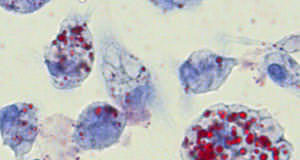Obese Brain May Thwart Weight Loss: Diets High In Saturated Fat,...
"Betcha can't eat just one!" For obese people trying to lose weight, advertising slogans such as this one hit a bit too close to home as it describes the daily battle to resist high calorie foods. But new research by Terry Davidson, director of American University's Center for Behavioral Neuroscience, indicates that diets that lead to obesity...
Zinc Deficiency Mechanism Linked To Aging, Multiple Diseases
A new study has outlined for the first time a biological mechanism by which zinc deficiency can develop with age, leading to a decline of the immune system and increased inflammation associated with many health problems, including cancer, heart disease, autoimmune disease and diabetes.
Patients With Rheumatoid Arthritis Appear To Be At Increased Risk For...
A study that included more than 45,000 residents of Sweden with rheumatoid arthritis finds that individuals with this disease had an associated higher risk of venous thromboembolism (a blood clot that forms within a vein), and that this elevated risk was stable for 10 years after the time of diagnosis, according to a study in the October 3 issue of JAMA.
Increase In Allergies Is Not from Being Too Clean, Just Losing...
A new scientific report out October 3 from the International Scientific Forum on Home Hygiene (IFH)[i] dismantles the myth that the epidemic rise in allergies in recent years has happened because we're living in sterile homes and overdoing hygiene.
Apple A Day Reduces Blood Levels Of Chemical Linked To Hardening...
Eating an apple a day might in fact help keep the cardiologist away, new research suggests. In a study of healthy, middle-aged adults, consumption of one apple a day for four weeks lowered by 40 percent blood levels of a substance linked to hardening of the arteries. Taking capsules containing polyphenols, a type of antioxidant found in apples, had a similar, but not as large, effect.
Hidden Stroke Impairment Leaves Thousands Suffering In Silence
Most people are completely unaware of one of stroke's most common, debilitating but invisible impairments, according to the first awareness survey of its kind in Canada released October 1 at the Canadian Stroke Congress. Thirty community volunteers trained by the York-Durham Aphasia Centre, a March of Dimes Canada program, collaborated with researchers from two Ontario universities in a survey of 832 adults in southern Ontario.
‘Cafeteria Diet’ Hastens Stroke Risk: High-Sugar, High-Salt Intake Creates ‘a Ticking...
The fat- and sugar-rich Western diet leads to a lifetime of health problems, dramatically increasing the risk of stroke or death at a younger age, according to a study presented October 1 at the Canadian Stroke Congress. Researchers found that a high-calorie, high-sugar, high-sodium diet nicknamed the 'cafeteria diet' induced most symptoms of metabolic syndrome -- a combination of high levels of cholesterol, blood sugar, blood pressure and obesity -- in rats after only two months.
New Way Of Fighting High Cholesterol Upends Assumptions
Atherosclerosis -- the hardening of arteries that is a primary cause of cardiovascular disease and death -- has long been presumed to be the fateful consequence of complicated interactions between overabundant cholesterol and resulting inflammation in the heart and blood vessels.
Melatonin And Exercise Work Against Alzheimer’s In Mice
The combination of two neuroprotective therapies, voluntary physical exercise, and the daily intake of melatonin has been shown to have a synergistic effect against brain deterioration in rodents with three different mutations of Alzheimer's disease.
Tai Chi Increases Brain Size, Benefits Cognition In Randomized Controlled Trial...
Scientists from the University of South Florida and Fudan University in Shanghai found increases in brain volume and improvements on tests of memory and thinking in Chinese seniors who practiced Tai Chi three times a week, reports an article published June 19 in the Journal of Alzheimer's Disease.














